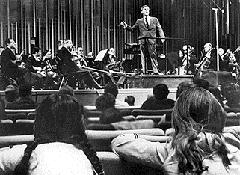The Hollywood Bowl has been hit by a double cancellation next Tuesday. Esa Pekka Salonen can’t make it for personal reasons and Yefim Bronfman has to undergo a medical procedure.
Flying in for Bronfman is Decca’s young Uzbek wonder, Behzod Abduraimov. Salonen is replaced by James Gaffigan.

Zoe Keating, the US-based electronic cellist who found a million-strong following on Twitter, has called time out on her playing career to care for her husband, who is battling a pernicious cancer. To their horror, the insurance refused to pay for treatment. Zoe reluctantly turned to her global following. Heart-warmingly, they have responded.
Read her latest post here. Do what you can to spread the word and help.

The establishment of a UK judicial inquiry into long-running rumours of child abuse by powerful men is one of those rare initiatives that restores faith in due process. A distinguished judge will, we are assured, get to the bottom of hundreds of complaints that politicians and public figures were given access to vulnerable boys and girls in social care homes. Some good may yet come of the odious life and crimes of Jimmy Savile.
There is a risk, however, of further suppression. Hysteria in high places will occupy the headlines in the coming months and occlude other occurrences of abuse in certain schools, notably in music schools. One man, Mike Brewer, was jailed last year for crimes he committed at Chetham’s in Manchester, another has pleaded guilty and a third has been charged.

A leading figure in the early music world, Philip Pickett, will face trial in January on charges that relate to the Guildhall School in London.
Police have live inquiries into half a dozen further cases, cut back from thirty in aftermath of the Brewer trial.
What is regrettable is that no action was taken against teachers and governors in Manchester who knew of Brewer’s crimes and covered up for him. Measures have been put in places to detect abuse, but past stains persist in several school and they will not be purged without a proper inquiry. Nigel Kennedy has drawn attention to past abuses at the Yehudi Menuhin School. The Purcell School exists in a state of denial about fairly recent events, reported on this site. Music schools are fertile places for child abuse. They need to be covered by the judicial inquiry.
Apparently, the watch comes free with a Classical Brit.

But the brand promotion is worth a lot more.

h/t: Guy Traviss
This was last night in Ashdod. Click on ‘Post’ to run video.
The inquest into the death of the violinist Frances Andrade has heard that the police detectives told her not to seek therapy before testifying against her rapist, Chetham’s ex-music director Mike Brewer, in case the counselling affected her memory.
Her GP put her on Prozac instead. Dr Alastair Bint said: ‘I remember feeling very concerned about her mental and now her physical health. I remember again raising psychiatry but she was resolute against it.’
It has emerged that Mrs Andrade took several overdoses and was hospitalised eight times in the months before her death.
‘I felt her mental health was more important than the criminal case, but she was not persuaded,’ said the doctor.
The inquest, which continues, has exposed serious failing in police and social care of rape victims. Anrade left a husband and four children.
Mike Brewer was jailed for six years.

Japan’s most successful composer, Ryuichi Sakamoto, announced today on his website that he is suffering from pharyngeal cancer and is canceling all professional commitments. Sakamoto, 62, said he was diagnosed last month after noticing an unusual feeling in his throat.
A lifelong anti-nuclear campaigner, he is refusing radiation treatment.
He said: I know my decision will cause trouble to a lot of people, but I had to make this tough decision because I can’t do this job without full health.’
We wish Ryuichi a full recovery.

You learn something every day.
Here are the basics from a new course for conductor branding by Mette Hojen, MA in Rhetorics and an expert in executive performance:

Find a pen and paper. Give yourself 5 minutes and write down the words that come to your mind when you pose this question to yourself:
What words or terms do I want musicians to describe me as?
For example, that could be:
Engouraging
Good at writing press releases
Inspiring
Good at PR
Humorous
Variation in rehearsals – always!
Expert in arranging music for brass ensembles
Warm
Respectable
Good networker
When your list is made, take a close look and pick three you want to work with.
Then, design you own personal brand pitch. You might find help by placing them in these opening sentences:
My name is (…)
I’m (…)
In my work I focus on (…)
I’m an expert in (…)
It’s important for me to (…)
I’m passionate about (…)
When your three phrases are linked together, you must read them out loud and practice.
Let’s try it:
My name is Herbert von Karajan
I’m Ruler of the Universe
In my work I focus on Control
I’m an expert in Everything
It’s important for me to Be in Control
I’m passionate about … Oh, I’ve forgotten about all that foolishness years ago.
The orch is offering 100 free tickets to all 18 Friday night subscription concerts during the 2014-15 season to applicants aged 13 to 26.
The intelligent gift is being financed by an anonymous donor. Details here.

Back to the future?
The outgoing music director of English National Opera has earned a surprise debut with the Boston Symphony Orchestra. Ed Gardner will conduct Copland, Beethoven and Strauss on Friday 18, while Pittsburgh’s Manfred Honeck, a fellow-debutant, takes over Mahler’s 2nd the following weekend.
Christoph von Dohnányi, 84, has been forced to withdraw ‘because of serious illness in his family’.

Italy’s Corriere della Sera yesterday published a full-page essay on classical agents, taking as its starting point some remarks we shared on Slippedisc.com about the recent retirement of Martin Campbell-White and Robert Rattray from AskonasHolt.

The article, by PierLuigi Panza has unfortunately not been published online. However, the author has given us permission to reprint his Italian text below. If you don’t read Italian, Google may help.
One caveat: In remarks about the relations between agencies and Italian theatres – ‘too intimate, and sometimes corrupt’ – I may have been misunderstood. I referred specifically in the interview to certain Italian agencies, not foreign ones.
Tensioni dietro le quinte della lirica «Agenti delle star, troppo potere»
L’accusa: cachet gonfiati. La replica: tanti teatri inadempienti. Autodifesa «Il costo degli interpreti incide solo per il 15-16% sui bilanci dei teatri. Alcuni non rispettano gli impegni o non pagano in attesa dei soldi pubblici»
Di Panza Pierluigi
MILANO — Nei giorni scorsi, la medaglia di Member of the Order of the British Empire per meriti musicali è stata assegnata agli agenti Martin Campbell-White e Robert Rattray della Askonas Holt, una delle maggiori agenzie del mondo. Sul suo sito www.slippedisc.com il celebre musicologo Norman Lebrecht ha stigmatizzato questa assegnazione, confortato da un largo seguito di commenti. «Bisognerebbe premiare chi ha fatto qualcosa per il genere umano, non per il profitto. Il ruolo degli agenti era di facilitare; oggi, invece, è quello di ostruire». La loro crescita, racconta al Corriere Lebrecht, «è iniziata 25 anni fa, in un momento in cui due o tre agenzie hanno incominciato a esercitare troppo potere, gonfiando le commissioni a un punto che il mercato non poteva più sopportare. Oggi, è vero, sono meno potenti, ma non meno dannose. Alcuni agenti sono utili, altri credono di poter attivare o disattivare i rubinetti». E se l’accusa è alle grandi agenzie, come la Askonas, «i rapporti tra agenti e teatri italiani sono ancora più intimi e, a volte, corrotti», afferma.
Insomma, è in discussione il ruolo degli agenti, che è ben lontano da quello che rivestivano nell’Ottocento quando un Bartolomeo Merelli si gloriava di aver portato Donizetti e Verdi alla Scala. La diatriba sugli agenti musicali in Italia ha una data d’inizio, il 1967, quando la legge 800 li mise al bando. Fu riconsentito loro di operare dal ‘79 e, dal 2008 (legge 112), la loro figura è stata equiparata a quella dei procuratori. Ma continuano a essere in discussione. Ai tempi dei megaconcerti di Carreras, Domingo e Pavarotti a Caracalla (1990) furono accusati di «voler solo fare business». Nel terremoto che investì la Scala nel 2005 (che portò alle dimissioni di Riccardo Muti) si parlò dell’invadenza del procuratore monegasco Valentin Proczynski. Nel luglio 2013, nel difendere Un ballo in maschera di Michieletto, l’economista Michele Trimarchi scrisse che «ne sistema mummificato della lirica pesano gli interessi delle agenzie». Recentemente, su corriere.it, il baritono Pierluigi Dilengite ha parlato di «casta della lirica» in cui «la maggior parte dei cantanti che passa un’audizione proviene dalle agenzie», aggiungendo che le «tre agenzie Stage door, Atelier musicale e Opera art hanno in mano il monopolio dei 13 enti lirici italiani».
Ma sono davvero così potenti le agenzie musicali? In Italia non esiste un loro registro. L’Aricas, la loro associazione costituita nel 1981, ne raduna 17 e si è dotata di un codice etico dove si fissano criteri di indipendenza e correttezza. I problemi che evidenzia questa associazione sono la massiccia presenza di agenzie straniere nel nostro Paese (che godono di benefici fiscali), l’assenza di un registro degli agenti e l’allarme sui «teatri lirici che non pagano».
«Non capisco le polemiche. Sembra che siamo una banda Bassotti che va a puntare la pistola alla tempia. Saremmo tutti ricchi!», racconta Raffaella Coletti, agente e consigliere dell’Aricas. «Non è così. Esiste complicità. Noi non imponiamo niente». Pacchetti chiusi? «Possiamo proporre un artista minore assieme a un grande, sta all’altro rifiutare — dicono sia Coletti che Giovanni Oldani di Music Center Domani —. Il punto è la credibilità dei teatri». Le agenzie italiane sono piccole, il proprietario è lo stesso agente che cura agenda e contratti. Un tempo si dividevano tra chi seguiva orchestre e direttori e chi i cantanti. Ora tutti fanno tutto; c’è chi rappresenta 10-15 artisti, chi 150. All’estero le agenzie sono colossi che radunano centinaia di artisti, come la londinese Askonas Holt (Mehta, Rattle, Alagna, Antonacci…) e le americane IMG Artist (Bychkov, Jurowski, Pappano…), Cami (Gatti, Gergiev, Levine…) o quelle del gruppo Universal come la CSAM (con Netrebko e Damrau).
Sono le agenzie a far lievitare i prezzi nella lirica? «Non credo — dice Oldani —. Anche perché il costo degli interpreti incide per il 15-16% sui bilanci dei teatri». In Italia, inoltre, i cachet massimi sono fissati per legge (DL 28 marzo 2006): 17 mila euro per cantanti e direttori (a cui si aggiunge un 20% per chiara fama); 25 mila euro per direttori e solisti nei concerti; ma li prendono pochissimi. Oggi il cachet massimo si aggira intorno ai 10 mila euro, e agli agenti va il 10%. Ad averli! Perché, racconta la Coletti «con i teatri stranieri si riesce a programmare e a venir pagati; con gli italiani… ti rimandano il contrato firmato una settimana prima, alcuni non lo rispettano e alcuni non pagano o lo fanno in ritardo. Molti artisti devono fare decreti ingiuntivi». Circa il 40% dei cantanti lamenta insolvenze.
La difesa dei teatri è ovvia: se i finanziamenti arrivano in ritardo vengono effettuati in ritardo. Alcuni teatri, però, negano agli agenti persino i biglietti per seguire gli artisti, segno che non sono temuti. Per Francesco Saverio Clemente di In Art, «la demonizzazione degli agenti è sciocca. Molti di noi hanno un grado di professionalità elevatissima. Ciascuno ha rapporti di maggiore o minor fiducia con alcuni interlocutori, ma questo sta nel gioco dei ruoli». Come sono questi rapporti? «Ci si trova a consigliare un giovane che il teatro non conosce. Quando si tratta di grandi artisti sono i teatri a chiederti di avere periodi liberi, idee di progetti. Poi ci sono alcuni sovrintendenti che hanno idee chiare. Pereira, come Lissner, sono uomini di personalità, che trattano con gli artisti personalmente. In quei casi noi diventiamo solo esecutori». Solo i piccoli teatri sono un po’ succubi degli agenti che, per altro, hanno lanciato interpreti come Daniela Barcellona, Maria Agresta, Francesco Meli… «Oggi — aggiunge Lorenzo Baldrighi della Baldrighi Artists Management — il ruolo di un’agenzia è quello di informare puntualmente la dirigenza di un teatro sulle qualità e lo stato di carriera di un artista».
Ma un conto sono i cachet fissati per legge in Italia, un conto quelli compositi (massimo di legge, più chiara fama, più sponsor, più sostegno di case discografiche) per gli interpreti più richiesti. Quelli compositi, utilizzati per attirare artisti che altrimenti in Italia non vedremmo, nessuno li riferisce. Cecilia Bartoli ha richieste ampiamente sopra il cachet di legge: si favoleggia di 60-80 mila euro a serata. Quindi o canta all’estero (dove non dovunque si guadagna di più, di certo in America) o si fa un cachet composito. Anche Lang Lang per una serata può addirittura raggiungere, si dice, tra i 50 e i 100 mila euro e i grandi direttori (Myung-Whun Chung, Chailly, Barenboim, Muti…) hanno cachet di 25 mila euro sul mercato domestico ma più alti all’estero. Per un recital fuori dall’Italia gli interpreti più richiesti, come Kaufmann o la Netrebko, superano i cachet imposti dalla legge italiana.
Marin Alsop’s team has just grown wings.
Markus Stenz is named BSO Principal Guest Conductor;
Ken Lam is BSO Associate Conductor for Education and Artistic Director of the Baltimore Symphony Youth Orchestras;
Nicholas Hersh is BSO Assistant Conductor;
Michael Repper is appointed 2014-2015 BSO-Peabody Conducting Fellow.
Extract below from interminable press release (is it agents who write these things?).


Baltimore, Md. (July 9, 2014) – The Baltimore Symphony Orchestra (BSO) is pleased to announce several conducting appointments: Markus Stenz as principal guest conductor, Ken Lam as associate conductor for education, Nicholas Hersh as assistant conductor and Michael Repper asthe 2014-2015 season BSO-Peabody conducting fellow.
Acclaimed German conductor Markus Stenz will begin his three-year tenure as principal guest conductor with the BSO in the 2015-2016 season. He will conduct three weeks each season. Stenz made his BSO debut in October 2012 to great critical acclaim, prompting Baltimore Sun Classical Music Critic Tim Smith to say of hisperformance: “Stenz made a thrice-familiar score newly gripping — this should be every musician’s goal each time at bat, but it just doesn’t work out that way very often — and he clearly bonded with the BSO. The players had an on-the-edge-of-their-seats look you don’t see from them too often onstage (they applauded Stenz as heartily as the audience after the performance). Each section revealed solid strengths; even the subtlest solos emerged with vivid personality.”
Music Director Marin Alsop, who begins a new six-year contract with the BSO in the 2015-16 season, said of Stenz’s appointment: “I’m delighted to be joined by long-time friend and colleague, Markus Stenz. We met when we were conducting fellows at Tanglewood in 1989 under Leonard Bernstein, Seiji Ozawa and Gustav Meier. When Markus debuted with the BSO, he immediately struck a rapport with our musicians, and they were as enthusiastic as I about creating a position that would bring him to Baltimore on a regular basis. With his wide-ranging experience as a symphonic and opera conductor, and his broad musical reach, Markus will be an outstanding addition to our artistic team. I look forward to our audiences and musicians connecting with him over the next three seasons.”













